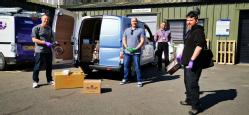Press Releases
New STM technique with super sharp frozen carbon monoxide needle points way to new and purer pharmaceuticals
Using a carbon monoxide tipped super sharp needle frozen to 7 Kelvin (minus 266 degrees centigrade), researchers at the University of Warwick can identify whether bonds are hydrogen or halogen, and are also able to pick up minute defects in these materials. These results could be of high relevance to help creating new pharmaceuticals that are purer than ever.
Verdel Instruments secures £1 million equity funding from Longwall Ventures
Verdel Instruments Limited (Verdel) has recently announced the close of its £1 million equity funding round from Longwall Ventures.
Verdel is a UK-based company pushing the boundaries of complex sample analysis using innovative Two-Dimensional Mass Spectrometry (2DMS) technology. The approach was originally developed for large, complex FT-ICR instruments, but Verdel has developed technology that transfers the technique onto commonly used, high throughput linear ion trap instruments. Verdel’s technology is based on research by Professor Peter O’Connor at the University of Warwick.
Ventilators, visors, volunteers and testing - More than a dozen more ways Warwick staff & students are helping respond to the pandemic
|
I promised to come back to you soon to tell you about even more about the work of many more of our dedicated staff and students I these challenging times and today I am keeping that promise. Here many more ways in which our students and staff are helping from ventilators, visors, and volunteering to helping produce more COVID-19 testing ,and providing online computing experiments for primary school children now learning at home. In many cases we can’t name the individuals as we want to leave them in peace to get on with their work but where we can they are named below. Once again I want to give my personal thanks to each and every one of them – they are all inspiring people that are helping us all in these difficult times.” |
|
Professor Stuart Croft |
Five ways in which University of Warwick staff and students are assisting in the response to the pandemic
 |
“There are many ways in which universities can actively assist in the response to the pandemic. Many of our staff and students have not just been asking how they can help but they have simply got on and done so. Here are just five of things those colleagues and students are doing now, some of whom are named below. I want to give my personal thanks to each and every one of them make note of what they have done to help. I hope very soon to be able to tell you about even more about the work of many more of our dedicated staff and students I these challenging times” Professor Stuart Croft, Vice-Chancellor of the University of Warwick |
Warwick chemist strikes Silver at poster competition in Parliament
Fabienne Bachtiger, a postgraduate at the University of Warwick, struck Silver at a competition in the House of Commons, for the excellence of her chemistry research, walking away with a £1,250 prize and medal.
Metals could be the link to new antibiotics
University of Warwick researchers, working with a network of international collaborators, have discovered 23 previously unexplored compounds containing metals such as silver, manganese, zinc, ruthenium and iridium that have antibacterial and antifungal activity. The researchers from the University's Department of Chemistry contributed insights into iridium – the ‘dinosaur metal’ that they have previously shown can attack cancer cells when switched on by light and formed part of the meteorite that wiped out the dinosaurs.
